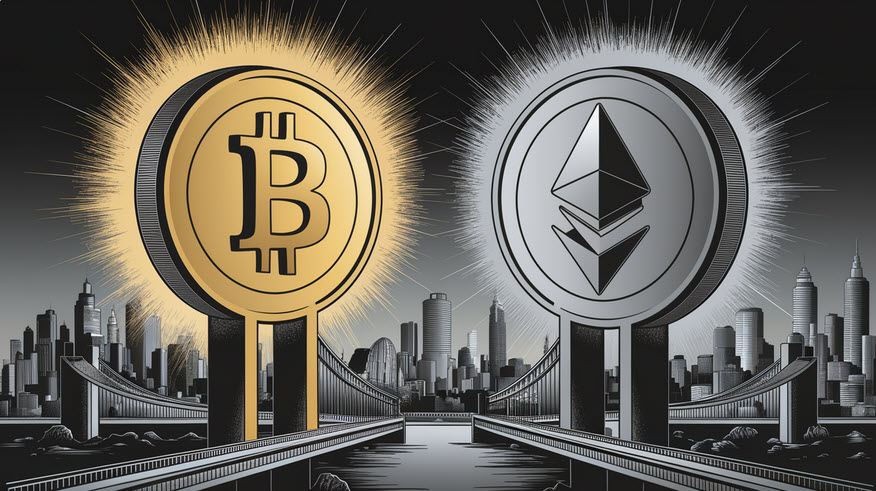Bitcoin vs. Ethereum: The ETF Gold Rush
Cryptocurrencies have stormed the financial world, and Bitcoin and Ethereum are leading the charge. With the recent green light for their ETFs, these digital titans are now more accessible than ever to the average investor. But what sets these crypto behemoths apart? And how will their ETF debuts reshape the investment landscape? Let’s dive in and uncover the secrets to their success.
ETF Selling Points
- Educational Impact: ETFs provide an opportunity for investors to learn about cryptocurrencies within a regulated framework, increasing overall market knowledge and confidence in digital assets.
- Institutional Adoption: Both Bitcoin and Ether ETFs pave the way for broader institutional adoption of cryptocurrencies, as they offer a more traditional investment vehicle for large entities like pension funds and insurance companies.
- Technological Integration: For example, BlackRock’s integration with Coinbase Prime and its use of advanced technology risk systems ensure seamless and secure management of crypto assets, appealing to tech-savvy investors.
- Regulatory Advancements: The approval of ETFs signals a positive regulatory environment, which can lead to further advancements and acceptance of other crypto-related financial products.
- Market Maturity: The introduction of these ETFs contributes to the maturity and stability of the cryptocurrency market, making it more attractive to conservative investors who were previously hesitant.
Bitcoin ETFs: The Numbers
- Price Movement: Bitcoin’s price recently surpassed $68,000, the first time it reached this level in more than a month. This was up from around $56,000 just a few weeks earlier.
- Price Drop: Bitcoin experienced a drop of 2% following its recent peak.
- Demand: Bitcoin products had near-record levels of demand, indicating high investor interest.
- Record Launch: The Bitcoin ETF launch was one of the most successful, gathering significant assets under management in a short time.
- Volume: Bitcoin ETFs saw a high volume of trading, highlighting strong market participation.
Ethereum ETFs: The Numbers
- Initial Price Reaction: Ethereum’s price remained little changed initially after regulatory approval and later dropped 1% over three consecutive days.
- Volume: New Ethereum ETFs recorded a trading volume of $250 million towards the end of the day, ranking among the top 50 best fund launches. The group also did about $1 billion in volume overall.
- Fees: The fee structure for Ethereum ETFs varies, with Grayscale’s Ethereum trust having the highest fees at 2.5%. Other products like iShares are at 25 basis points.
- Staking: Currently, 29% of all Ethereum is staked, indicating a significant portion of investors are participating in staking.
- Stablecoins: Ethereum’s blockchain is a major platform for stablecoins, which settled $9.3 trillion in transactions, showcasing its extensive use and application.
These figures illustrate the substantial activity and interest surrounding both Bitcoin and Ethereum ETFs, reflecting their prominence in the digital asset market.
Bitcoin ETF: The Digital Gold

Selling Points:
- Stability and Recognition: Bitcoin is often referred to as “digital gold” because of its long-standing presence and recognition in the market. Investors see it as a stable store of value, similar to gold.
- High Demand: Bitcoin ETFs have shown near-record levels of demand, a testament to its popularity and trust among investors.
- Regulation and Security: Bitcoin ETFs are regulated, providing a safer way for investors to gain exposure to Bitcoin without having to deal with the complexities of digital wallets and private keys.
Outlook: Bitcoin’s recent price rise has sparked speculation that it might hit new record highs. This optimism is partly due to the potential positive impact of future political changes. Regardless of short-term price fluctuations, Bitcoin’s established reputation and increasing acceptance in the financial system make its ETF a strong contender for long-term investment.
Ether ETF: The Technological Innovator

Selling Points:
- Technological Edge: Unlike Bitcoin, which is primarily seen as a store of value, Ethereum is a platform for innovation. Its blockchain supports smart contracts, decentralized applications (dApps), and other technological advancements.
- Market Adoption: Ether’s blockchain is the backbone for many other cryptocurrencies and projects, increasing its utility and demand.
- Diverse Applications: Ethereum is more than just a currency. It’s a platform that can transform various industries through its ability to execute smart contracts and support decentralized finance (DeFi).
Outlook: Ether ETFs have started strong, with significant trading volumes and a promising future. As more industries adopt blockchain technology, Ethereum’s role as a foundational platform will likely drive its value higher. The future of Ether ETFs looks bright as they continue to attract both retail and institutional investors.
Comparing Bitcoin and Ether ETFs
While both Bitcoin and Ether ETFs offer a way to invest in cryptocurrencies without the need for direct ownership, they cater to different investor needs and interests. Bitcoin ETFs are ideal for those looking for a stable, recognized asset. In contrast, Ether ETFs are perfect for investors interested in technological innovation and diverse applications.
Ether ETF: Navigating Competition
Ethereum, despite its strong position in the cryptocurrency market, faces significant competition from other blockchain platforms. Competitors like Solana, Cardano, and Polkadot offer similar functionalities with some advantages, such as faster transaction speeds or lower costs. These platforms aim to improve upon Ethereum’s scalability and efficiency issues, making them attractive alternatives.
However, Ethereum’s established ecosystem, widespread adoption, and continuous upgrades, like the transition to Ethereum 2.0, help it maintain a competitive edge. As a foundational platform for smart contracts and decentralized applications, Ethereum’s ability to innovate and adapt will be crucial in staying ahead in the competitive landscape.
Future Expectations
The approval of Bitcoin and Ether ETFs by regulators is a significant step towards mainstream acceptance of cryptocurrencies. This move has brought digital assets into a regulated environment, making them more accessible and safer for a broader range of investors.
Looking ahead, the continued growth and acceptance of these ETFs depend on various factors, including regulatory developments, technological advancements, and market adoption. As more investors become educated about the benefits and risks of crypto ETFs, we can expect to see a steady increase in their popularity.
Conclusion
Bitcoin and Ether ETFs offer unique advantages, catering to different investment strategies. Bitcoin’s stability and recognition make it a reliable choice for long-term investment, while Ether’s technological edge and diverse applications provide exciting growth opportunities. As the market evolves, these ETFs will play a crucial role in bringing cryptocurrencies to a wider audience.
Move faster on the path of less resistance..
